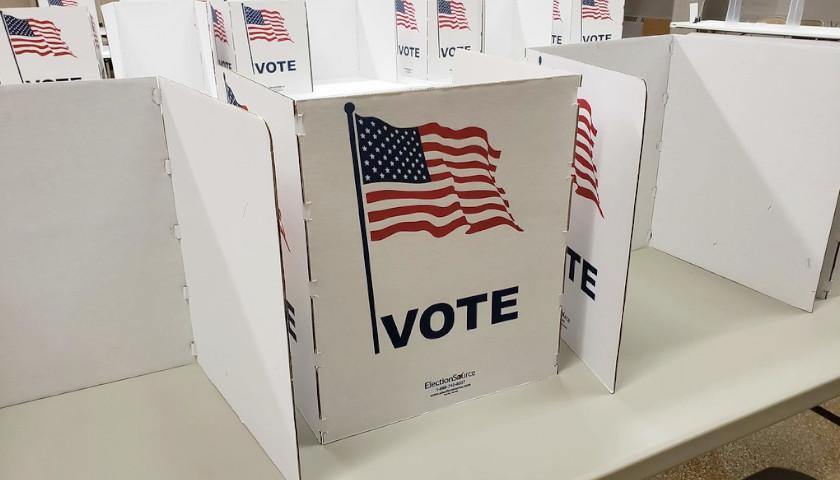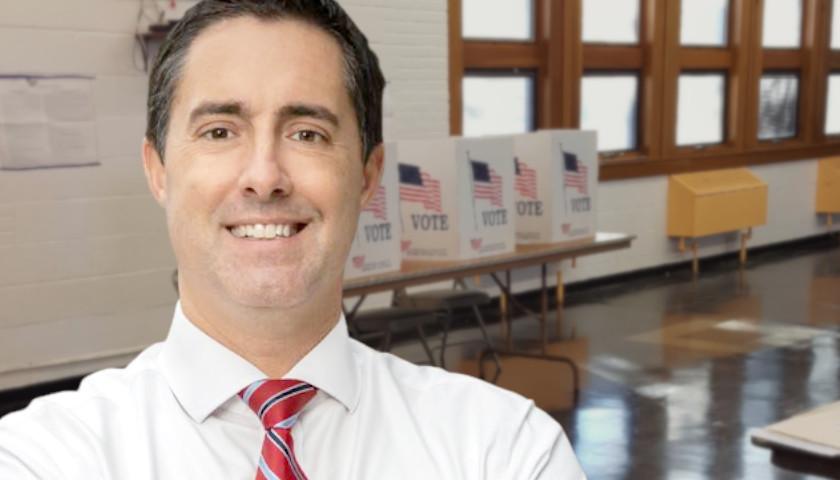The League of Women Voters – Tennessee (LWVTN) filed a federal lawsuit challenging the legality of a new law that requires Tennessee primary voters to be affiliated with the political party whose primary elections they plan to vote in, according to a Wednesday news release.
“The League of Women Voters of Tennessee and Tennessee voters Victor Ashe and Phil Lawson filed a federal lawsuit today challenging state laws that require voters to be ‘bona fide’ members of a political party to vote in the state’s open primary elections,” the release says.
The LWVTN lawsuit hinges on the definition of “bona fide,” as the group says there is no way to define that term. The group also says the new law could “create confusion and intimidation.”
The law in question is 2023’s HB0828, which took effect on May 17.
HB0828 “requires the officer of elections at each polling place to post a sign on election day informing voters that it is against the law to vote in a political party’s primary without being a bona fide member of or affiliated with that political party, or to declare allegiance to that party without the intent to affiliate with that party,” according to its summary.
The law’s intent is to prevent vast swaths of Democrats from banding together to vote for a preferred Republican primary candidate, or vice versa. It was passed along party lines in the Republican-controlled General Assembly but without major controversy.
“This new law will have a chilling effect on Tennesseans exercising their right to vote and creates unnecessary confusion for voters,” said Debby Gould, president of the LWVTN. “The League of Women Voters will continue to fight to ensure that all voters are empowered at the ballot box and can feel confident in their right to vote.”
Many states require voters to prove association with the party of the primary candidates they intend to vote for, called a “closed primary.” Those states include Florida, Pennsylvania, New York and Delaware, among others.
“In general, a voter seeking to vote in a closed primary must first be a registered party member,” the National Conference of State Legislatures (NCSL) explains. “Typically, the voter affiliates with a party on his or her voter registration application. This system deters “cross-over” voting by members of other parties. Independent or unaffiliated voters, by definition, are excluded from participating in the party nomination contests. This system generally contributes to a strong party organization.”
According to NCSL, other states have “partially closed” primaries, in which “state law permits political parties to choose whether to allow unaffiliated voters or voters not registered with the party to participate in their nominating contests before each election cycle,” or “partially opened” primaries, in which voters must “must publicly declare their ballot choice or their ballot selection may be regarded as a form of registration with the corresponding party.”
Tennessee is an “open primary” state, which typically means that voters do not have to register with a political party to vote for that party in a primary election.
– – –
Pete D’Abrosca is a reporter at The Tennessee Star and The Star News Network. Follow Pete on Twitter/X.
Photo “Voting Booths” by Corey Seeman. CC BY-NC-SA 2.0.









I get so tired of that “I’m and Independent and I wont be able to Vote” excuse–tough. If you are too stupid to educate yourself, decide and register for the party where you wish to cast your Vote, too bad.
Closed Primaries prevent a LOT of RINOs getting elected. It is that simple and the #1 reason TN needs them!
Sorry, Karen but my experiences in states with closed primaries is not the same as yours. It prohibits stuffing the ballot box of the candidate of one party by voters of the opposing party as has been the case of Tennessee. An “independent voter” can pick a party in order to vote in the primary then turn around and vote for whomever they wish in the general election. Maybe some of the “independent” voters would be forced to take a close hard look at the platforms of the opposing parties rather than sitting out the dance.
The Bill Haslam model of government, get both sides to support a failed model of government and you can decide which one of your friends you want to fill the seat. AKA the swamp at the state and local level.
The State Legislature could close the primaries and require party registration to vote in a primary. It refuses to do so simply because it returns the power to the people. The league of Democrat Women Voters and former mayor turned Democrat gossip columnist Victoria Ashe know this. They loose their influence if primaries are closed. Each of us have not only the right to vote but the civic responsibility to exercise that right wisely. Having served in public office and as a political Party Chairman I can assure you that neither side has the public’s interest in mind. The lawsuit is a waste of time and money.
You people have no clue. i have lived, voted and campaigned in both closed and open primary states. Guess what? The people in the closed primary states want open primaries for the very same reason the uninformed voter in TN wants closed primaries. CHEATING and trying to sway votes to or from candidates. If you think this does not happen in a closed primary then you truly have no understanding of how things work with a closed primary. It is not as easy as it is in an open primary but it is not difficult and they do what they have to do to play with the primary results just lie open primary states. The one big problem with closed primaries is that if you sign up as an Independent you cannot vote in the primary. This is one reason I prefer open primaries because more people can vote and the primary is what determines who runs in the general election. For example when I lived in PA…….they had a huge Independent registered voter population and none of them could vote in the primary. That to me is a huge problem. On the other hand micro targeting in a closed state is easier than in an open state but not impossible. I did micro-targeting when I ran for County Commissioner here in TN. So it can be done. WAKE UP. Always thinking the grass is greener on the other side of the fence until you find out it is not.
Which should remind us of the how desperately the Republican establishment wants to keep it as easy as possible for Democrats to vote against conservative candidates in Republican primaries and the Open Primaries Eight who voted against closing the primaries in the last session of the legislature. Who are the Open Primaries Eight you ask?
John Crawford – Kingsport
William Slater – Gallatin
Dave Wright – Corryton
Dale Carr – Sevierville
Esther Helton Haynes – East Ridge
John Holsclaw – Elizabethton
Rebecca Alexander – Jonesborough
Michael Hale – Smithville
Conservatives need to make voting against closing the primaries the third rail of Tennessee politics. The Open Primaries Eight need to find themselves with a well-financed primary challenge next year which in and of itself will wipe the smile off of their faces.
“The law in question is 2023’s HB0828, which took effect on May 17.”
“Tennessee is an “open primary” state, which typically means that voters do not have to register with a political party to vote for that party in a primary election.”
Which is it? Are we now a closed primary state, or are we an open primary state?
Having lived in different states with different laws, I am inclined to think the closed primary is the way to go. As for the LWVTN lawsuit, it is a waste of time and resources. This in no way limits a person’s ability to vote in the general election of any given office seeker. It merely allows for the person attempting to represent a party seeking office to be selected by the party in which they wish to represent (that almost sounds like something Kamala might say, lol).